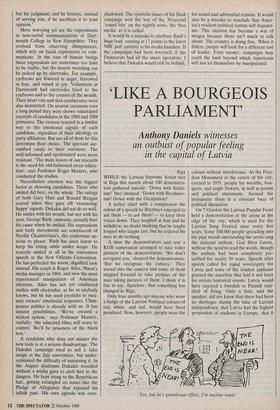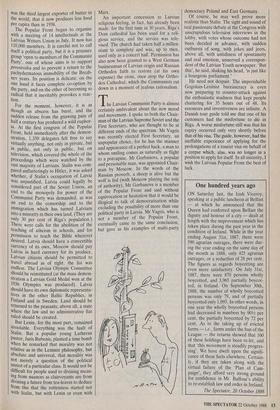`LIKE A BOURGEOIS PARLIAMENT'
Anthony Daniels witnesses
an outbust of popular feeling in the capital of Latvia
Riga WHILE the Latvian Supreme Soviet met in Riga this month about 100 demonstra- tori gathered outside. 'Down with Stalin- ism!' they shouted. 'Down with Brezhnev- ism! Down with the Occupation!'
A police chief with a complexion the colour of a speech by Brezhnev emerged to ask them — to ask them! — to keep their voices down. They laughed at him and he withdrew, no doubt thinking that he laughs longest who laughs last, but he ordered his men to do nothing.
A man the demonstrators said was a KGB cameraman arranged to take video pictures of the demonstrators. 'We don't recognise you,' shouted the demonstrators. 'But we recognise the camera.' They waved into the camera and some of them stepped forward to take pictures of the man taking pictures of them. I think it is fair to say, therefore, that something has changed in Riga.
Only four months ago anyone who wore a badge of the Latvian National colours of red, white, and red, would have been penalised. Now, however, people wear the colours without interference. At the Free- dom Monument in the centre of the city, erected in 1935, people lay wreaths, bou- quets, and single flowers, as well as poems and political statements. Around the monument there is a constant buzz of political discussion.
On 7 October the Latvian Popular Front held a demonstration in the arena at the edge of the city, which is used for the Latvian Song Festival once every five years. Some 100,000 people spreading into the pine woods surrounding the arena sang the national anthem, God Bless Latvia, without the need to read the words, though the anthem had been completely pre- scribed for nearly 50 years. Speech after speech called some equal sovereignty for Latvia and some of the loudest applause greeted the assertion that had it not been for certain historical events, Latvia would have enjoyed a Swedish or Finnish stan- dard of living. Only a fool, said the speaker, did not know that there had been no shortages during the time of Latvian independence, that Latvia had the highest proportion of students in Europe, that it 'Yes, but he's greenhouse effect, I'm nuclear waste.' was the third largest exporter of butter in the world, that it now produces less food per capita than in 1938.
The Popular Front began to organise with a meeting of 14 intellectuals at the Latvian Writers Union in July. It now has 110,000 members. It is careful not to call itself a political party, but it is a pressure group 'open to members of the Communist Party', one of whose aims is to support perestroika and to prevent a return to the pachydermatous immobility of the Brezh- nev years. Its position is delicate: on the One hand it faces complete co-option by the party, and on the other of becoming so radical that it inevitably provokes a reac- tion.
For the moment, however, it is as though an abscess has burst, and the sudden release from the gnawing pain of half a century has produced a wild euphor- ia. At the first congress of the Popular Front, held immediately after the demon- stration, 1,350 delegates felt free to say virtually anything, not only in private, but in public, not only in public, but on television, which covered the whole of the proceedings which were watched by the vast majority of Latvians. Stalin was com- pared unflatteringly to Hitler, it was asked whether, if Stalin's occupation of Latvia was unjustified, Latvia could legally be considered part of the Soviet Union, an end to the monopoly for power of the Communist Party was demanded, as was an end to the censorship and to the immigration which has turned Latvians into a minority in their own land. (They are only 30 per cent of Riga's population.) There were calls for the abolition of the teaching of atheism in schools, and for permission to teach the Bible wherever desired. Latvia should have a convertible currency of its own, Moscow should pay Latvia in hard currency for its produce, Latvian citizens should be permitted to travel abroad as of right: the list was endless. The Latvian Olympic Committee should be reinstituted (at the mass demon- stration a Latvian Gold Medal won at the 1936 Olympics was produced). Latvia should have its own diplomatic representa- tives in the other Baltic Republics, in Finland and in Sweden. Land should be returned to the peasants; above all, a state where the law and no administrative fiat ruled should be created.
But Lenin, for the most part, remained inviolable. Everything was the fault of Stalin. But a popular young Lutheran pastor, Juris Rubenis, planted a time bomb when he remarked that morality was not relative as in the Leninist philosophy, but absolute and universal, that morality was not merely a question of the • political unrest of a particular class. It would not be difficult for people used to divining mean- ingfrom nuances as clairvoyants are from divining a future from tea-leaves to deduce from this that the rottenness started not with Stalin, but with Lenin or even with Marx.
An important concession to Latvian religious feeling, in fact, has already been made: for the first time in 30 years, Riga's Dom cathedral has been used for a reli- gious service, and the service was tele- vised. The church had taken half a millen- nium to complete and was, up to then, used only as a concert hall. Permission has also now been granted to a West German businessman of Latvian origin and Russian Orthodox faith to restore (at his own expense) the cross, once atop the Ortho- dox Cathedral, which the Communists cut down in a moment of jealous rationalism.
The Latvian Communist Party is almost certainly ambivalent about the new mood and movement. I spoke to both the Chair- man of the Latvian Supreme Soviet and the First Secretary, who are thought to be at different ends of the spectrum. Mr Vagris was recently elected First Secretary, an unpopular choice, for he has the manner and appearance of a perfect hack, a man to whom smiling comes as naturally as flight to a porcupine. Mr Gorbanovs, a popular and personable man, was appointed Chair- man by Moscow. In the words of the Russian proverb, a sheep is alive but the wolf is fed (with Moscow playing the role of authority). Mr Gorbanovs is a member of the Popular Front and said without equivocation or hesitation that it would be illogical to talk of democratisation while excluding the possibility of more than one political party in Latvia. Mr Vagris, who is not a member of the Popular Front, eventually came to the same conclusion, but gave as his examples of multi-party
democracy Poland and East Germany.
Of course, he may well prove more realistic than Stalin. The sight and sound of real passionate debate at the Congress with unscrupulous television interviews in the lobby, with votes whose outcome had not been decided in advance, with sudden outbursts of song, with jokes and jeers, above all, with untidiness of spontaneity and real emotion, unnerved a correspon- dent of the Latvian Youth newspaper. 'But this', he said, shaking his head, is just like a bourgeois parliament.'
He need not despair. The imperishable Gogolian-Leninist bureaucracy is even now preparing to counter-attack against the enthusiastic madness that kept people chattering for 35 hours out of 48. Its resources and inventiveness are infinite. A Danish tour guide told me that one of his customers had the misfortune to die in Riga. A worse misfortune still was that his expiry occurred only very shortly before that of his visa. The guide, however, had the ineffable experience of applying for the prolongations of a tourist visa on behalf of a corpse which, alas, was no longer in a position to apply for itself. In all sincerity, I wish the Latvian Popular Front the best of luck.



































































 Previous page
Previous page